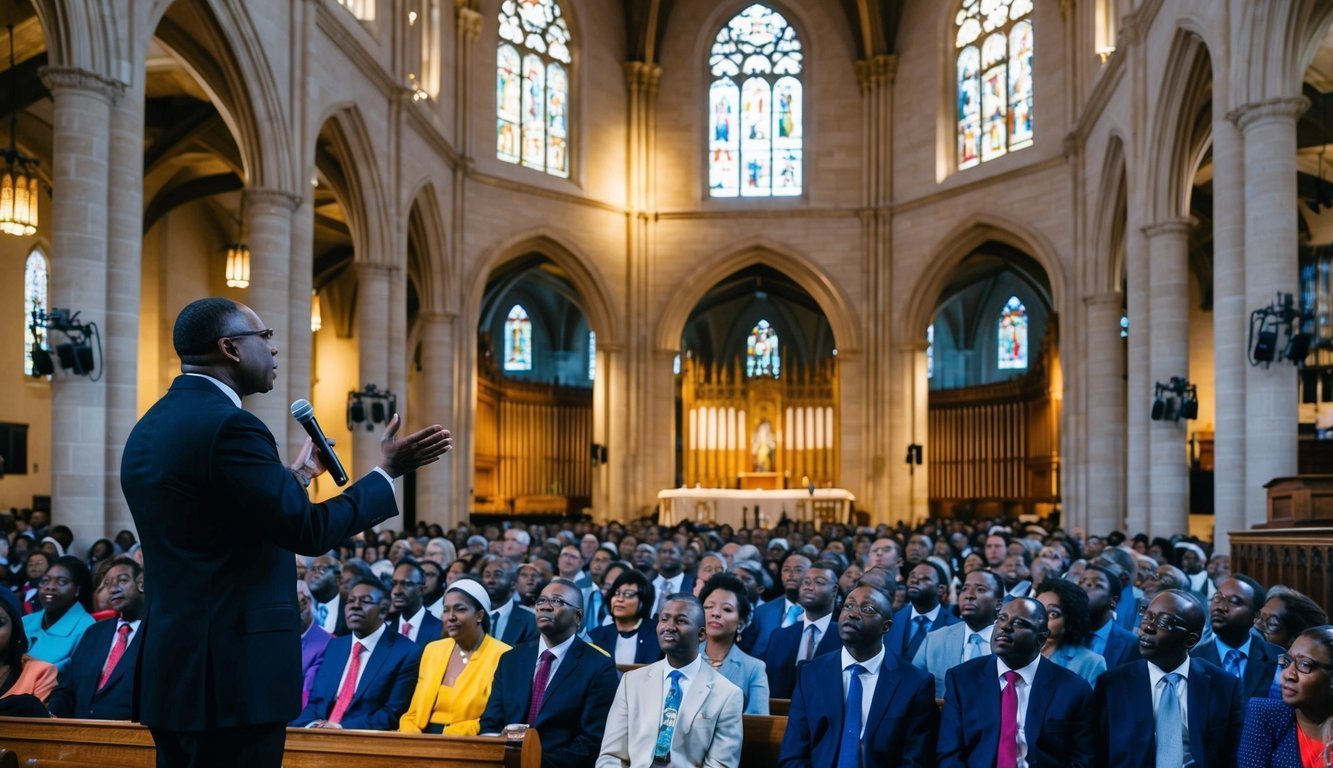PsychNewsDaily Publishers
100 Summit Drive
Burlington, MA, 01803
Telephone: (320) 349-2484
PsychNewsDaily Publishers
100 Summit Drive
Burlington, MA, 01803
Telephone: (320) 349-2484
Powerful Christian sermons have historically shaped faith, inspiring personal transformation and community engagement through core messages of salvation, love, suffering, and the Holy Spirit's guidance.

Throughout history, powerful sermons have shaped the faith of countless individuals. These messages often touch on core truths of Christianity and inspire congregations to grow in their belief and action. The seven most powerful Christian sermons ever preached hold timeless lessons that resonate today, reminding believers of the strength and depth of their faith.
Many renowned preachers have delivered messages that spark transformation and healing. From issues of suffering to the love of Christ, these sermons address the challenges and hopes of life. They encourage listeners to reflect on their personal journeys and to seek a deeper connection with their faith and community.
As they explore the sermons that have made a significant impact, readers will discover how these messages continue to inspire and motivate people in their spiritual lives. Each sermon highlights the importance of faith and the church in guiding individuals towards a more meaningful existence.

The history of powerful Christian sermons is rich with influential figures and movements. These sermons not only shaped church practices but also sparked significant social and spiritual change.
Throughout history, many preachers have stood out for their powerful messages. George Whitefield was known for his dramatic style and fervent delivery during the Great Awakening. His sermons traveled across the American colonies, igniting a spiritual revival.
Charles Spurgeon, often called the “Prince of Preachers,” captivated audiences in the 19th century with his deep understanding of Scripture. His ability to connect with everyday people made his messages resonate widely.
These preachers, among others, used their platforms to challenge norms and inspire believers, leaving a lasting impact on the Christian faith and community.
Revival movements have been pivotal in Christian history. They have often emerged during times of spiritual stagnation, calling people back to faith.
Billy Graham was a significant modern-day figure in this area. His crusades attracted millions and provided clear messages about salvation and repentance.
These revivals emphasized personal transformation. They encouraged attendees to reflect on their beliefs and deepen their relationship with God. The impact of such meetings often reached beyond the church, affecting communities as people were inspired to act on their faith.

Gospel preaching holds a unique ability to transform lives through its powerful messages. Preachers emphasize the importance of faith in Christ, helping listeners understand the path to being born again. The legacy of evangelists also plays a significant role in evangelism and spreading the gospel.
Effective preaching starts with crafting messages that connect deeply with people. Preachers draw upon scripture and personal experiences to inspire their audience.
Through these techniques, preachers can share powerful truths that resonate with their congregation. This approach prompts listeners to reflect and engage with their faith, leading to meaningful spiritual growth.
Evangelists have played a crucial role in spreading the gospel throughout history. They are known for their passionate messages, often filled with the power of God. Figures like Billy Graham and S.M. Lockridge left lasting impacts through their inspiring sermons.
Their legacy includes:
By preaching the gospel, evangelists encourage others to explore their faith and find hope in Christ.

This section examines key theological themes that appear in powerful Christian sermons. Each theme provides insights into the Christian faith and helps believers understand their relationships with God and others.
Salvation is a central theme in many sermons. It emphasizes that Jesus Christ is the only way to be saved. The act of repentance is crucial here. It calls believers to turn away from sin and seek forgiveness.
In one famous sermon, Jesus teaches that acknowledging one’s sins allows the Holy Spirit to work in their life. True repentance is not simply feeling sorry but involves a change in behavior. This transformation shows a commitment to living a Christ-like life.
Sermons about salvation often remind listeners that eternal life is a gift from God. This gift can be accepted through faith and repentance.
The kingdom of God is often described as both a present reality and a future promise. It reflects God’s reign in the hearts of believers and the world. Jesus speaks of living in a way that reflects this kingdom now.
Many sermons focus on the end times, urging believers to stay alert and prepared. They are encouraged to live righteously, knowing that God’s kingdom will be fully realized in the future.
The resurrection plays a vital role in this theme. It assures believers of their future hope and the coming return of Christ. This connection encourages Christians to share the good news and live authentically in faith.
Love is foundational to the Christian life. Sermons teach about the importance of loving God and others. This love is not just a feeling; it requires action.
Jesus’ command to “love your neighbor” is highlighted in numerous sermons. Believers are called to show compassion and kindness, reflecting the love of God in their everyday lives.
Many preachers emphasize the role of the Holy Spirit in empowering Christians to love. When believers open their hearts to the Spirit, they can exhibit genuine love and service. Living out this love strengthens the community and bears witness to the transformative power of Christ.

Christian living often involves facing difficulties that can test faith. Many believers encounter suffering and adversity, yet these experiences can lead to personal transformation. By persevering through tough times, they grow spiritually and strengthen their relationship with God.
Suffering is a common part of the Christian experience. Many saints in the Bible faced tremendous challenges. Job lost everything yet remained faithful. His story teaches that endurance in hardship can bring about deeper faith.
Adversity can take many forms: illness, loss, or emotional struggles. These moments often encourage believers to rely on God more. They can foster a sense of community as people support one another. In sharing their struggles, they draw closer to God and each other.
Perseverance during trials is crucial for growth. It helps believers develop strength and resilience. The Apostle Paul emphasized this in Romans 5:3-5, noting how challenges produce character and hope.
As Christians face and overcome obstacles, they often experience transformation. This growth can lead to a richer spiritual life. Through prayer and reflection, they find guidance and strength in their faith.
By remaining steadfast, they learn valuable lessons about trust, hope, and love. Celebrating these triumphs builds a strong foundation for living the Christian life.

Living out the teachings from powerful sermons requires action and support from the community. It is essential to rely on the Holy Spirit and engage with the family of God for guidance and encouragement.
The Holy Spirit plays a vital role in helping believers understand and live out sermon messages. It provides strength, wisdom, and comfort.
Embracing the Holy Spirit makes it easier to follow Christ’s teachings. It encourages them to engage in practices like thanksgiving and wise counsel. This support can lead to positive changes in their lives.
Being part of the family of God encourages accountability and growth. The church community is essential for living out sermons as it provides support and fellowship.
Interacting with the community fosters a sense of belonging. Together, they can discuss and act on the teachings they learn, making faith an active part of their lives.

Many people are curious about the most powerful sermons in Christianity. They often seek to learn about great preachers, find impactful sermons, and understand what makes a sermon memorable and heart-touching. Here are some answers to common questions.
Several preachers have left a lasting impact through their sermons. Notable figures include Jonathan Edwards, known for his sermon “Sinners in the Hands of an Angry God,” and Charles Spurgeon, often called the “Prince of Preachers.” Their messages continue to resonate with many today.
Many impactful sermons can be found in church archives, online platforms, and Christian bookshops. Websites like YouTube or sermon streaming services often feature popular and influential sermons. Additionally, books on church history may highlight key sermons that have shaped Christian thought.
A powerful sermon often includes clear biblical teachings, relatable messages, and emotional depth. The preacher’s delivery and ability to connect with the audience also play a significant role. A great sermon should inspire and challenge listeners to reflect on their faith.
Collections of top sermons can be found in many Christian books. Libraries often carry anthologies of famous sermons. Online resources like websites dedicated to Christian literature also provide access to many well-known sermons in written form.
The Sermon on the Mount, delivered by Jesus, is often regarded as the greatest sermon in history. It includes core teachings like the Beatitudes and guidance on how to live a moral life. This sermon has influenced countless individuals and teachings within Christianity.
When seeking sermons that resonate emotionally, look for personal stories, relatable examples, and heartfelt truths. The use of imagery and passionate delivery can also draw listeners in.
A good sermon often invites reflection and personal growth in their spiritual journeys.